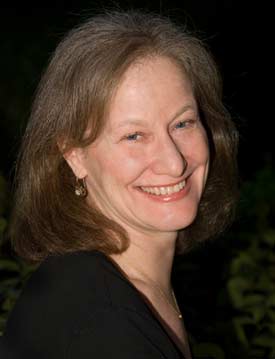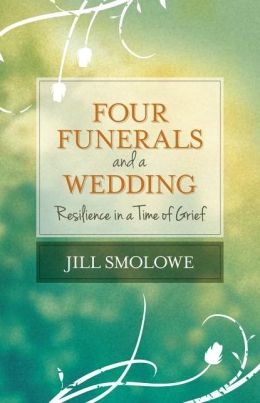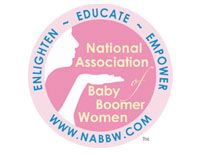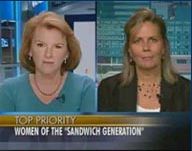 New NABBW member Jill Smolowe has written an amazing book.
New NABBW member Jill Smolowe has written an amazing book.
(Read below to find out how you can ask her questions about it this Thursday April 10th.)
Four Funerals and a Wedding: Resilience in a Time of Grief is a memoir covering a seventeen month period of her life, during which she buried her husband, her mother, her mother-in-law and her sister.
What makes the book amazing is that is actually an affirming and uplifting memoir – and not just because it ends with the “life goes on affirmation” of a family wedding.
As I read the book, I found myself speculating:
- Perhaps Smolowe is able to detach herself form her grief and command such clarity in writing of her experiences because she is a gifted and award-winning journalist.
- Maybe she was able to successfully tell this story with such honesty because she has a great editor who helped her keep her focus.
- Or possibly the truth of how she is so capably able to tell her story with a bracing lack of sentimentality is proof of the research Smolowe discovered during her grieving period, which she shares with her readers.
The book recounts that as she watched four close family members die during such a short time period, Jill anticipated that once it was all over — AFTER she’d buried her husband — she’d have a nervous breakdown and fall apart.
And why wouldn’t she expect to fall apart after such a major emotional shellacking? After all, our society’s conventionally accepted five-stage grief paradigm takes us sequentially through steps of denial, anger, bargaining, depression, and finally acceptance – always in that order.
So when that didn’t happen, Jill, found herself wondering if there was something freakish about her personal response.
Not one to sit idly by and worry about her reactions, (Jill is, after all, an award-winning journalist whose work has appeared in numerous publications including the New York Times, The Boston Globe, and The Washington Post Magazine — not to mention that she’s been a foreign affairs writer for Time and Newsweek and currently works as a senior writer for People) she decided to research the grieving process.
In the process, she discovered that the previously accepted grief model crucially discounts our human capacity for resilience. Newer grief research reveals that we are actually hardwired to deal with our losses much more efficiently: We don’t just endure, we prevail.
Here at NABBW, we’ve been so fascinated by this book, we have invited Jill Smolowe to be our guest for a free, one hour teleseminar this Thursday evening: April 10th at 8 PM Eastern. During that live event, “An Honest Look at the Grief Experience,” Jill will:
Share advice on how to help friends who are grieving
Offer suggestions on what to say to someone who is grieving the loss of a loved one and
Explain why she wishes the phrase, “Please let me know if there’s anything I can do for you,” will soon be expunged from our vocabularies
We’ll record the event, but IF YOU DIAL INTO THE LIVE CALL you will be able to personally ask Jill how to best handle to those uncomfortable moments we all experience in the face of loss. And — better yet — she will answer you, in person, on the call.
WE HOPE YOU WILL ATTEND.Please click on this hyperlink for details on how to access the call.
Meanwhile, while we were arranging the teleseminar, we had a few moments with Jill during which we were able to ask her our favorite “Voices of Baby Boomer Women” questions. Here are her responses:
Using one paragraph, tell us a bit about yourself?
During a seventeen-month period that spanned 2009 and 2010, I lost four of the people who gave my life meaning: my husband, sister, mother and mother-in-law.
That followed more than two years of caregiving while my husband, Joe, battled leukemia. His illness, which involved long hospitalizations, upstaged our wonderful home life with our daughter, disrupted our journalism careers, and rearranged our assumptions about the future.
During those years of sickness, I kept thinking that if Joe died, I’d have to reimagine my whole life. But loving relatives, supportive friends and accommodating colleagues showed me that I still had a life well-worth living. That revelation stirred a keen sense of gratitude that constantly reminded me how very fortunate I am.
In the years since Joe’s death, I’ve come to appreciate that the human spirit is remarkably resilient.
Tell us about your family; married, divorced, children, grands, boomerangs or parents living with you, etc.
Seven months after Joe’s death, I met Bob, a water engineer from a few towns over who’d lost his wife of 38 years just months before I lost my husband of 24 years. We forged a fast connection, in no small part because we shared a similar sensibility about grief.
Together, we learned that is was possible to be happy and sad at the same time.
Bob moved in with me in 2012, right after my daughter, Becky, left for her freshman year of college. In January 2013, we married. His daughter, Bex, officiated, his son, Adam, was his best man, and Becky was my maid of honor.
We’ll never be the Brady Bunch—all of the kids are adults—but this new family tableau makes me very happy.
What is your favorite childhood memory that is reminiscent of growing up in the 50s, 60s or 70s?
After my younger sister, Ann, died from colon cancer in 2010, there was this tiny memory that kept looping through my mind: We’re sitting on her bedroom floor playing jacks while we master the lyrics to “America” on Simon & Garfunkel’s Bookends album.
What qualities do you have that speak of our generation of women?
Determination, independence and tenacity rank high on the list. Absent those, how would we juggle our marriages, our children, our careers, our friendships and our pedicures?
I also think that I and my cohorts have a healthy measure of caring, compassion and selflessness, or lack of self-centeredness, that enables us to listen closely and put others’ needs and interests before our own.
There’s one more quality that I admire in many of my friends, one that I’ve always wished I had far more of: patience.
I’ve always been drawn to men and women who think for themselves and are not afraid to speak their minds, however unfashionable the opinion. I’m also inspired by people’s generosity and kindness.
As the recipient of an outpouring of concern and goodwill during Joe’s illness, and then after his death, I am awed by the human impulse to be of service in times of need.
What brings you the most pleasure in midlife?
- Spending time with my husband, my daughter, my dad and brothers, my two stepchildren, my friends.
- Rambling walks fueled by interesting conversation.
- My new work as a grief and transition coach.
- And, as always, reading and writing.
Do you have any interesting hobbies?
Does reading count? Because lying on a couch, book or e-reader in hand, is my favorite position.
I also enjoy making scrapbooks. I used to do the cut-and-paste variety that I learned from my mother; these days I create them digitally.
I know that doesn’t sound “interesting,” but I promise you that when you hand a friend or relative a scrapbook filled with memories, they find it very interesting.
Do you have a favorite book or movie? If so, tell us why it’s your favorite.
I’ve been a voracious reader all my life, with eclectic tastes that explore the centuries, the continents, and the sensibilities of a wide range of authors.
But there are four books I’ve come back to most often:
- Jane Austen’s Pride and Prejudice,
- Henry James’s Portrait of a Lady,
- Edith Wharton’s House of Mirth, and
- Anne Tyler’s Dinner At the Homesick Restaurant.
Each time I go back into the pages of those books, I’m enthralled by the authors’ portrayals and dissections of their characters’ motivations and behavior.
Do you travel and if so, who are your favorite travel partners and where do you like to go?
Joe and I used to make an overseas trip every year.
With my new husband, Bob, we’ve started assembling a wish-list. At present, our top destinations are the Scandinavian fjords, Cartagena, and Arches National Park in Utah.
I also love to travel with my daughter. I’m a directional dyslexic; Becky navigates with ease. We take things at a similar pace. And we’ve yet to come upon a menu where we can’t find two dishes that we want to share.
Do you practice preventive medicine? Please elaborate.
I do regular mammograms, colonoscopies, physicals, and dental cleanings, though what I mean by “regular” is under review, given the shifting medical advice that keeps coming at us.
To maintain good health, I eat a low-carb diet that leaves room for cheating.
And I exercise. That includes a lot of fast-paced walking and, because I need to stretch to counteract all the sitting I do in front of a computer screen, Pilates classes several times a week.
What do you stress about?
Multitasking. I’m much calmer (and happier) when I’m focused on one thing: a conversation, a piece of writing, a PBS Mystery episode.
Is it important for you to retain your youthful looks, and if so, to what degree are you willing to go?
I’ve never been into make-up or fashionable clothing, so I don’t spend a lot of time in front of the mirror anguishing over (or even noticing) new wrinkles. For me, retaining my “youthful looks” means keeping a vigilant eye on my weight and muscle tone.
Have you re-invented yourself, and if so, how?
Well, there’s that new marriage I mentioned.
I’ve also launched a new career as a grief and transition coach. The eight-month training program was fascinating.
I’ve been a journalist for 37 years, but coaching has taught me a different way of listening and asking questions.
Now, as I coach clients who are dealing with all kinds of loss—deaths, divorces, empty nests, job changes—I feel engaged and reinvigorated.
Do you plan to retire?
Coaching is my retirement plan. That, and finding my next book project.
Are you doing anything to GO Green?
Yes, but not nearly enough.
- I use efficient lightbulbs.
- Set the thermostat lower (though this hardly counts as a sacrifice. Menopause totally reset my body temperature!)
- I use cloth grocery bags in lieu of plastic.
- And I refuse to drive an SUV.
Can you pinpoint major turning points in your life that led to your life’s work/play at midlife?
I pretty much covered that earlier. It doesn’t get more major than losing the much-loved spouse with whom you expected to live out your days.
Do you still have unfulfilled dreams, and are you doing anything to accomplish them?
I would love to see one of my four unpublished novels make its way into the hands of readers.
How do you make a difference in the lives of others, your community, your world?
I very much hope that my new memoir, Four Funerals and a Wedding, helps to expand Americans’ assumptions about grief.
In the United States, we have a very narrow and misguided understanding of bereavement, based on a premise—the so-called five stages of grief—that was dismissed by grief researchers years ago.
The research of the last 20 years shows that a clear majority of mourners are resilient. Rather than going to pieces, they experience their grief as a constant oscillation between sadness and lighter moments.
This helps them not only to endure their sadness, but also to experience pleasure even during the earliest days of loss.
I wrote this book both to give voice to this silent resilient majority and to widen their well-wishers’ understanding about what useful support may involve.
Who has had the biggest influence on your life and why?
My parents. By serving as both my early role models early on and the people against whom I rebelled as I matured, they were the ones who introduced me to the values that inform and guide my choices.
If you were to have a personal mission statement, what would it be? Feel free to be as serious or fun as you choose.
Loss is universal; grief is personal. Do it your way.
 Get E-Mail Updates
Get E-Mail Updates 










